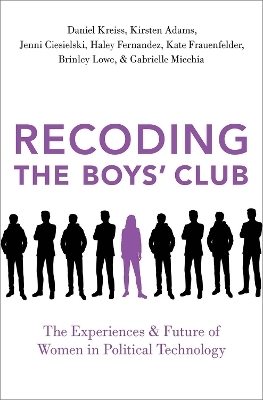
Recoding the Boys' Club
Oxford University Press Inc (Verlag)
978-0-19-753594-3 (ISBN)
Recoding the Boys' Club is a ground-breaking deep-dive into the work experiences of women in the political technology field in the United States. Political technology sits at the intersection of two fields dominated by men--politics and technology--and has become a cornerstone of operations in political campaigns and political institutions more generally. Drawing on a unique dataset of 1004 staffers working in political technology on presidential campaigns from 2004-2016, analysis of hiring patterns during the 2020 presidential primary cycle, and interviews with 45 women who worked on 12 different presidential campaigns, this book reveals the underrepresentation of women in political technology, especially leadership positions, as well as the struggle women face to have their voices heard within the "boys' clubs" and "bro cultures" of political technology. It chronicles the gendered expectations women face to provide emotional labor, stereotypes about women's competencies that shape their opportunities, the ways in which women's ideas are discredited, and the formal and informal forms of exclusion in campaign culture--leading to widespread feelings of "imposter syndrome" among women in this environment. These issues are often compounded by a mentality that the well-being of staffers must come secondary to the goals of the campaign, despite what campaigns might profess publically about gender and labor. Since these campaigns are important entry and training points for the wider field of political technology, the gendered inequities encountered within them have implications for women's professional experiences and careers long after campaigns have ended. This book aims to help political practitioners create more gender equitable and inclusive workplaces, ones that value the ideas and skills of all those who work to get candidates elected.
Daniel Kreiss is the Edgar Thomas Cato Distinguished Associate Professor in the Hussman School of Journalism and Media at the University of North Carolina at Chapel Hill, and a principal researcher of the UNC Center for Information, Technology, and Public Life. Kirsten Adams is a Ph.D. candidate and Roy H. Park Fellow in the Hussman School of Journalism and Media at the University of North Carolina at Chapel Hill, and a graduate research fellow with the Center for Information, Technology, and Public Life. Jenni Ciesielski is a graduate of the University of North Carolina at Chapel Hill, where she studied journalism. She currently works in Democratic political communications. Haley Fernandez is a graduate of the University of North Carolina at Chapel Hill, where she studied public relations and political science. After graduation, she worked as Director of Digital Communications for Eleison Group, LLC. Haley currently works on the digital team at Chapman Cubine and Hussey. Kate Frauenfelder is a graduate of University of North Carolina at Chapel Hill, where she studied public relations and public policy. She currently works in communications for Democratic political campaigns. Brinley Lowe attended The University of North Carolina at Chapel Hill, where she graduated with honors in journalism and political science. She currently works in strategic communications at Bully Pulpit Interactive. Gabrielle Micchia is a graduate of The University of North Carolina-Chapel Hill where she studied public relations and political science. Gabrielle currently works on the digital team at a New York global public relations agency.
Introduction: The Political Tech Glass Ceiling
Chapter Two: Political Technology as a Field
Chapter Three: The Underrepresentation of Women in Political Technology
Chapter Four: The Problem of Inclusivity
Chapter Five: The Lack of Accountability on Campaigns
Conclusion: How Political Tech Can Become More Equitable
Methodological Appendix
Notes
References
Index
| Erscheinungsdatum | 05.08.2020 |
|---|---|
| Verlagsort | New York |
| Sprache | englisch |
| Maße | 160 x 243 mm |
| Gewicht | 440 g |
| Themenwelt | Sozialwissenschaften ► Politik / Verwaltung ► Politische Systeme |
| Sozialwissenschaften ► Politik / Verwaltung ► Staat / Verwaltung | |
| Sozialwissenschaften ► Politik / Verwaltung ► Vergleichende Politikwissenschaften | |
| Sozialwissenschaften ► Soziologie ► Gender Studies | |
| ISBN-10 | 0-19-753594-1 / 0197535941 |
| ISBN-13 | 978-0-19-753594-3 / 9780197535943 |
| Zustand | Neuware |
| Haben Sie eine Frage zum Produkt? |
aus dem Bereich


